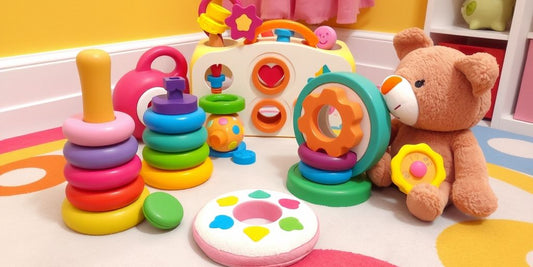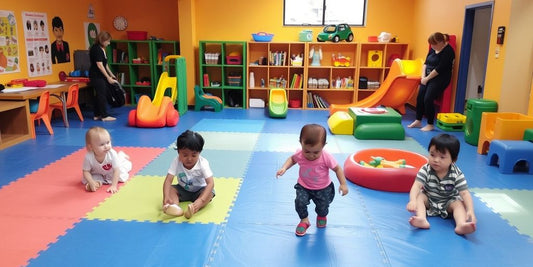Teething can be a challenging time for both babies and parents. As those tiny teeth begin to emerge, your little one may experience discomfort and pain. Fortunately, there are many ways to help soothe a teething baby. From safe toys to home remedies, this guide will provide you with practical tips and tricks to make this stage a bit easier for everyone.
Key Takeaways
- Recognize the common signs of teething, such as drooling, irritability, and the urge to chew on things.
- Choose safe teething toys and accessories, like chilled teething rings, to help ease discomfort.
- Try home remedies like gum massages, cool washcloths, and chilled fruits to soothe your baby's gums.
- Maintain good oral hygiene by wiping excess drool and gently cleaning your baby's gums.
- Create a comforting environment with warm baths, soothing music, and lots of cuddles to help your baby feel better.
Recognizing the Signs of Teething
When your infant starts teething, it can be a very challenging time. However, there are number of baby teething tips to help soothe your child!
If your baby is around 6 months (timing does vary), you may start noticing these symptoms of teething:
- Sore or tender gums
- Drooling
- Irritability
- Low-grade fever around 99 F
- Chewing
- Diarrhea
- Drool rash around the mouth
WHAT ARE THE MOST COMMON SYMPTOMS OF TEETHING?
There are many signs of teething, and not all children will experience the same group of symptoms. Because babies can’t explain what they are feeling, it is important to watch for symptoms. Some of the most common signs of teething in infants include:
- The gums are red where the tooth is going to erupt
- Running a mild temperature (under 100.4)
- Increased drooling, which may also cause a rash on the face
- Lots more chewing and gnawing than is typical
- Feeling anxious, cranky, or uncomfortable
- Poor sleep (difficulty falling asleep, wakefulness throughout the night, insufficient napping, etc)
DO BABIES ACT SICK WHILE TEETHING?
10 TIPS ON HOW TO SOOTHE A TEETHING BABY
Teething is a natural process and every baby experiences it. But, on occasion, teething can cause a few uncomfortable symptoms, including
- mild irritability
- occasional crying
- low-grade fever (lower than 101 degrees Fahrenheit)
- excessive drooling
- the desire to chew on hard items
- swollen and tender gums.
Safe Teething Toys and Accessories
Choosing the Right Teething Rings
When selecting teething rings, it's important to choose ones that are free from harmful chemicals. Look for options made from food-grade silicone, which is gentle on your baby's gums. Avoid teething rings made from hard materials like wood, metal, or plastic, as these can be too harsh and potentially harmful.
Using Chilled Teething Toys
Chilled teething toys can provide extra relief for your baby's sore gums. Simply place the teething toy in the refrigerator for a short period. Be cautious not to freeze the toy, as this can make it too hard and uncomfortable for your baby to use. Chilled teething toys are a great way to soothe your baby's discomfort while ensuring they are safe and effective.
Always supervise your baby when they are using teething toys to ensure their safety and prevent any potential choking hazards.
Home Remedies for Teething Pain
One of the most effective ways to relieve teething pain is through gentle gum massage. After thoroughly washing your hands, use your fingers to softly rub your baby's gums in circular motions. This can provide immediate relief and your baby might even start to suck or chew on your fingers, which is perfectly normal.
A cool washcloth can be a simple yet effective remedy for teething pain. Wet a clean washcloth with cold water and let your baby chew on it. The cold temperature can help numb the gums and reduce discomfort. Make sure the washcloth is clean to avoid any infections.
Offering chilled fruits and vegetables can be a natural way to soothe your baby's teething pain. Foods like watermelon, cucumber, and strawberries can be refrigerated and given to your baby to chew on. Not only do they provide relief, but they are also nutritious. Always supervise your baby to prevent choking hazards.
Experiment with different natural remedies to find what works best for your baby. Every child is unique, and what soothes one may not work for another.
Maintaining Oral Hygiene During Teething

Wiping Excess Drool
Teething often leads to increased drooling, which can cause skin irritation. All infants should have a daily oral cleaning with a soft, damp cloth. Gently wipe your baby's gums to remove any lingering milk or formula and help prevent irritation.
Cleaning Baby's Gums
Teeth cleaning in babies should start from the teething process. Babies' teeth and gums should be gently cleaned with a clean cloth or a soft toothbrush. This helps keep their mouth bacteria-free and sets the stage for good oral health as they grow. Regular cleaning can also prevent tooth decay and other dental issues later on.
Good hygiene starts early. Even though your baby will ultimately lose these teeth, you want the baby teeth and gums to remain healthy in preparation for the new adult teeth.
By maintaining a simple routine, you can ensure your baby's mouth stays clean and healthy during this challenging time.
Creating a Comforting Environment

Warm Baths
A warm bath can be incredibly soothing for a teething baby. The warm water helps to relax their muscles and can provide a distraction from the discomfort. Make sure the water is not too hot and always stay with your baby during bath time for safety.
Soothing Music and White Noise
Playing soft, calming music or white noise can help to create a peaceful environment for your baby. This can be especially helpful during nap times or bedtime. The gentle sounds can mask other noises that might disturb your baby and help them to relax.
Cuddling and Comforting
Sometimes, the best way to help a baby in discomfort is some extra cuddle time. Rocking your baby in a big chair or carrying your baby around the house in a baby carrier are great ideas. The extra cuddle time will help provide both of you with some needed rest. If you breastfeed, don’t be afraid to give your baby additional nursing sessions for comfort. It is important to provide your infant with a calm environment to help them relax and fall asleep.
Comfort your baby: hugging, holding, or snuggling with your baby may help reduce feelings of irritation and distress that interfere with sleep.
Foods to Soothe Teething Pain
Chilled Fruits
Offering cold foods can help ease teething discomfort. Watermelon, cucumber, blueberries, and strawberries are excellent choices. These fruits are not only nutritious but also provide a soothing effect on your baby's gums. Chilled homemade applesauce and avocado are also great options.
Cold Yogurt and Purees
Cold yogurt and purees can be a tasty and soothing treat for your teething baby. The cool temperature helps numb the gums, providing relief from teething pain. You can also freeze mild foods like bananas and yogurt cubes to make a refreshing snack.
Snack time can be a perfect opportunity to reduce the discomfort that a teething baby feels.
What to Avoid When Soothing a Teething Baby
When trying to soothe your teething baby, it's important to know what to avoid to keep them safe and comfortable. Not all teething treatments are good choices for your little one. Here are some things you should steer clear of:
Unsafe Teething Products
Avoid using teething rings that are filled with liquid. If they break, they can create a choking hazard. Also, don't freeze teething rings as they can become too hard and hurt your baby's gums. Instead, opt for chilled, but not frozen, teething toys.
Over-the-Counter Medications
Stay away from teething tablets and topical numbing medications. These often contain ingredients like belladonna and benzocaine, which can be harmful to babies. Numbing gels also tend to wash away quickly due to excessive drooling, providing little relief.
It's best to stick with safe, simple remedies to help your baby through the teething process.
Conclusion
Teething can be a tough time for both babies and parents, but with the right tips and tricks, you can help make it a bit easier. From gum massages to chilled fruits, there are many ways to soothe your little one's discomfort. Remember, every baby is different, so it might take some trial and error to find what works best. Always keep your baby's safety in mind and consult with a healthcare provider if you have any concerns. With patience and care, you'll get through this teething phase together.
Frequently Asked Questions
What are the common signs that my baby is teething?
Common signs of teething include excessive drooling, a desire to chew on hard objects, swollen and tender gums, mild irritability, and occasional crying. Some babies may also have a low-grade fever.
When should I consult a pediatrician about my baby's teething?
You should consult a pediatrician if your baby has a high fever, diarrhea, or if the teething symptoms seem to be causing severe discomfort. It's always best to get professional advice if you're concerned.
Are there any safe teething toys I can give my baby?
Yes, there are many safe teething toys available. Look for teething rings made of rubber or silicone. Some can be chilled in the fridge for extra soothing relief.
Can I use over-the-counter medications to soothe my baby's teething pain?
It's best to avoid over-the-counter medications unless advised by a healthcare provider. There are many natural remedies like gum massage and chilled teething toys that can help.
How can I maintain my baby's oral hygiene during teething?
You can maintain your baby's oral hygiene by wiping excess drool and gently cleaning their gums with a soft, damp cloth. This helps prevent irritation and keeps their mouth clean.
What foods can help soothe my baby's teething pain?
Chilled fruits like bananas and cold yogurt or purees can provide relief for your baby's sore gums. Always supervise your baby while they are eating to ensure they don't choke.









